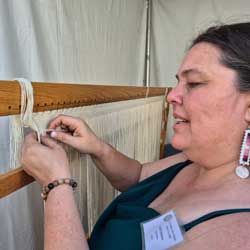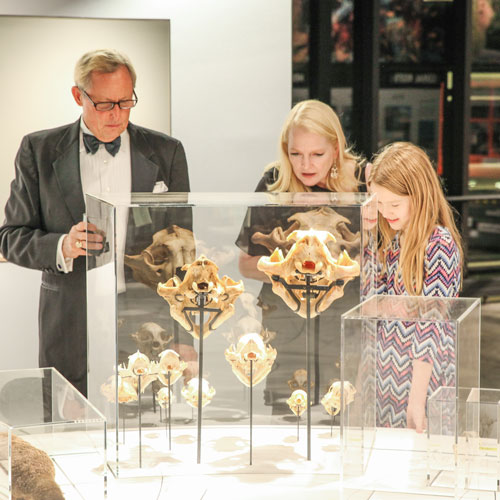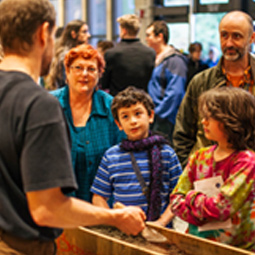Ruth Hallows and Jay Hallows in the Artist Studio
Date & Time
Wednesday, June 18, 2025
2–5 p.m.
This event is in the past.
Tickets
Included with admission;
FREE for Burke members
Not a member? Join today.
Northwest Coastal People were removed from our ceremonial textiles when traders and museums collected our Ravenstail and Chilkat regalia while governments outlawed weaving. In 1884, Canada amended its Indian act so that every Indian or person who engaged or helped in celebrating potlatch was guilty of a misdemeanor and liable to imprisonment for not more than six nor less than two months in any goal or other place of confinement. Encouraging potlatch, even indirectly by weaving, was liable for the same punishment. Similar laws were enacted in the United States and lifted in the 1980s. Canada stopped publishing the potlatch ban in 1951, but the law has not been repealed.
Ravenstail weaving slept for nearly 200 years until researchers began documenting our ways of life. While studying Chilkat dancing blankets, Cheryl Samuel received materials from Carolyn Osborne about a “geometric Chilkat”. The Yakutat Blanket research mentions three similar weavings. Samuel discovered 15 similar robes at museums in Europe, Canada, and the US. Samuel was allowed to handle them, pick them up, turn them over, and investigate how the wefts moved around the free hanging warps. Together with Northwest Coastal basketry and Chilkat weavers, she reverse-engineered the techniques of Ravenstail weaving.
Ravenstail weaving skills have returned to the hands of Northwest Coastal People, but our historical robes are still in museum collections. Mentor weaver Ksm Lx'sg̱a̱n, Ruth Hallows and apprentice weaver Jay Hallows work in tandem with more than twenty weavers to symbolically restore historical Ravenstail robes by reweaving them and bringing them home to dance in ceremony. The pair wove the first inch of the Skatins' robe during the Heard Museum Indian Fair & Market in March 2025, and completed the outer border while demonstrating at the S'edav Va'aki Museum a week later. They dedicated the next two months to weaving faces in the bold inner border. During their visit to the Bill Holm Center for the Study Northwest Coastal Art at the Burke Museum this summer, they will begin weaving the central design field.
 About the Artist
About the Artist
Urban Tsimshian textile artist Ksm Lx'sg̱a̱n Ruth Hallows weaves in the Chilkat and Ravenstail traditions of Northwest Coastal People. Born in Tacoma, WA surrounded by their family’s cedar basketry, they dreamt of traveling to Alaskan community to learn to weave. Ruth moved progressively further from the northwest coast until their family settled in the Sonoran Desert.
Ruth’s dreams slept until the world shifted in response to the pandemic and their personal life shifted in alignment. Together with Northwest Coastal community, they overcame financial, temporal, and geographical barriers to weave Ravenstail during lockdown with Kay Field Parker. Since 2021, they continue to gather weaving skills, including Chilkat weaving with mentorship from Wooshkindeinda.aat Lily Hope; spruce root basketry with Aanutein Deborah Head; cedar basketry with Ksgooga Gwisgwaasgm Gyemk Janice Jainga-Lonergran and Tl’aakahlwaas Vicki Soboleff; and pattern design with Naakil.aan Hans Chester and Steve Brown.
Ruth’s first solo project, Our Sisters Dance with Us, was recognized Best of Ravenstail Category at the Sealaska 2022 Celebration Juried Art Show. Haida artist and master Chilkat weaver Kujuuhl Evelyn Vanderhoop awarded an honorable mention to Ruth’s Unmasking – A Chilkat Inspired Self-portrait during the Sealaska 2024 Celebration Juried Art Show. Their two most recent pieces were juried into the 2025 Heard Museum Indian Fair & Market Best of Show Competition where their Ravenstail ensemble We Remember the Voices of All Our Ancestors earned the Carol Ann Mackay award for First Place in Weaving & Textiles, Cultural Attire.
Ruth maintains a daily practice of Chilkat and Ravenstail weaving with thier son, spinner and weaving apprentice. Jay Hallows in their home on Tohono O'odam traditional lands near Phoenix, Arizona.

